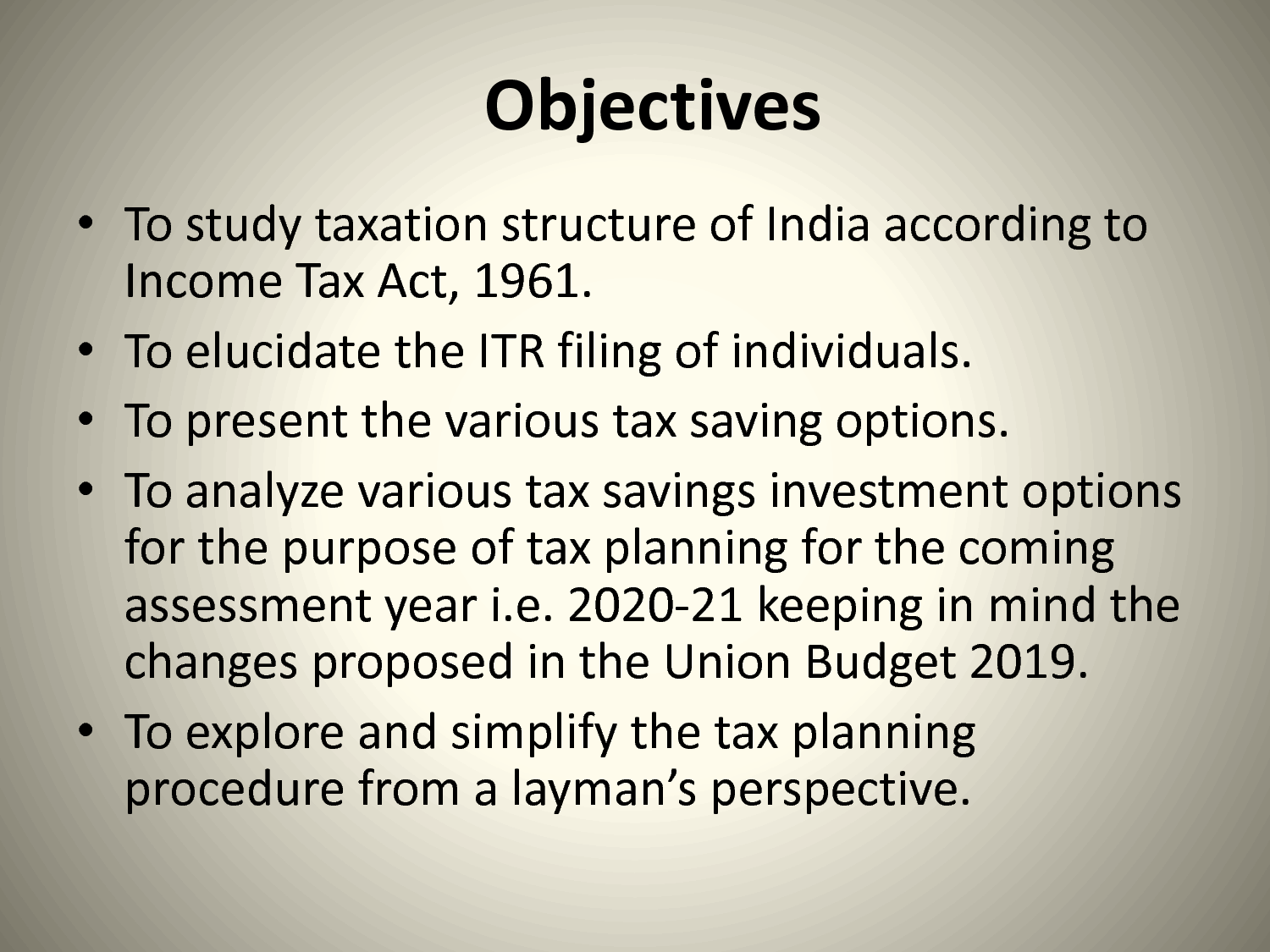

Finance
What Is Advanced Federal Tax Planning?
Published: January 20, 2024
Learn about advanced federal tax planning in finance and maximize your tax savings. Discover strategic approaches to optimize your financial planning and minimize tax liabilities.
(Many of the links in this article redirect to a specific reviewed product. Your purchase of these products through affiliate links helps to generate commission for LiveWell, at no extra cost. Learn more)
Table of Contents
Introduction
When it comes to managing your finances, understanding the intricacies of tax planning is crucial. The concept of federal tax planning refers to the strategic approach individuals and businesses take to minimize their tax liabilities while remaining compliant with the tax laws set by the federal government. This involves analyzing income, expenses, deductions, and credits to effectively optimize your tax position.
While basic tax planning involves adhering to standard deductions, credits, and exemptions, advanced federal tax planning takes your financial management to the next level. It allows you to explore more complex strategies and legal loopholes to ensure you take advantage of every available opportunity to save on taxes.
Advanced federal tax planning goes beyond traditional methods and involves a deeper understanding of tax laws, regulations, and financial instruments. It requires a comprehensive analysis of your income sources, investments, business structure, and estate planning. By incorporating sophisticated strategies into your financial planning, you can potentially minimize your tax burden and maximize your overall wealth.
In this article, we will delve into the realm of advanced federal tax planning. We will explore what it entails, the benefits it offers, and key strategies to implement. Additionally, we will highlight common mistakes to avoid, ensuring you make informed decisions and optimize your tax planning efforts. So, let’s dive in and discover the world of advanced federal tax planning!
What is Federal Tax Planning?
Federal tax planning is the process of strategically managing your finances to minimize your tax liability while remaining compliant with the tax laws set by the federal government. It involves analyzing your income, expenses, deductions, and credits to develop a plan that optimizes your tax position.
At its core, federal tax planning aims to legally reduce the amount of taxes you owe, allowing you to keep more of your hard-earned money. It is a proactive approach that involves making financial decisions throughout the year to strategically position yourself for maximum tax savings.
There are several key components to federal tax planning. Firstly, it involves understanding the tax laws and regulations that apply to you, including income tax brackets, deductions, exemptions, and credits. This knowledge enables you to make informed decisions and take advantage of tax-saving opportunities.
Secondly, federal tax planning requires careful consideration of your income sources and ways to minimize taxable income. This can be achieved through various strategies such as retirement contributions, tax-efficient investments, and business deductions.
Furthermore, federal tax planning involves optimizing deductions and credits to reduce your taxable income. This may include itemized deductions such as mortgage interest, state and local taxes, and medical expenses. Additionally, tax credits such as the Child Tax Credit or the Earned Income Credit can provide significant savings.
It’s important to note that federal tax planning is not about evading taxes or engaging in illegal activities. It is about utilizing the provisions within the tax laws to your advantage. By taking a proactive approach, you can ensure that you are minimizing your tax liability while still complying with all relevant regulations and statutes.
Overall, federal tax planning is a vital component of your overall financial management. By strategically managing your tax obligations, you can maximize your savings, invest in your future, and achieve your financial goals.
Understanding Advanced Federal Tax Planning
Advanced federal tax planning takes tax management to a higher level by utilizing more complex strategies and techniques to minimize tax liabilities. It goes beyond the standard deductions and credits, delving into areas that require a deeper understanding of tax laws and financial instruments.
One key aspect of advanced federal tax planning is the consideration of different tax scenarios and the impact on your overall tax liability. This involves analyzing your income sources, investments, and potential changes in your financial situation to develop a customized tax plan.
Advanced tax planning also involves incorporating sophisticated strategies to optimize your tax position. This may include utilizing tax-efficient investment vehicles such as tax-exempt bonds or participating in tax-loss harvesting to offset capital gains with capital losses.
Additionally, advanced federal tax planning explores legal tax loopholes and strategies for high-net-worth individuals and business owners. These individuals often have more complex financial situations, such as multiple sources of income, business structures, or estate planning considerations.
For business owners, advanced federal tax planning may involve strategies such as restructuring business entities, utilizing tax credits and incentives, or implementing tax-efficient employee benefit plans. It may also include exploring international tax considerations, such as transfer pricing or offshore entities, to optimize tax outcomes.
Estate planning is another significant aspect of advanced tax planning. By crafting an estate plan that takes advantage of estate tax exemptions and other tax-efficient strategies, you can minimize the tax liability on your assets when transferring them to your heirs.
Moreover, advanced federal tax planning involves staying informed about changes in tax laws and regulations. This ensures that you are aware of any new opportunities or requirements that can impact your tax planning strategies.
Overall, advanced federal tax planning requires a thorough understanding of the intricacies of tax laws, financial instruments, and individual or business circumstances. By engaging in advanced tax planning strategies, you can optimize your tax position and potentially achieve significant tax savings.
Benefits of Advanced Federal Tax Planning
Engaging in advanced federal tax planning offers numerous benefits for individuals and businesses alike. Let’s explore some of the key advantages:
- Minimize Tax Liability: One of the primary benefits of advanced federal tax planning is the ability to minimize your tax liability. By leveraging sophisticated strategies, utilizing tax credits and deductions, and optimizing your income and investments, you can potentially reduce the amount of taxes you owe.
- Maximize Tax Savings: Advanced tax planning allows you to maximize your tax savings. By taking advantage of tax-efficient investment vehicles, implementing tax strategies tailored to your situation, and staying up to date with changes in tax laws, you can optimize your financial position and keep more of your hard-earned money.
- Greater Financial Flexibility: By effectively managing your tax liabilities, advanced federal tax planning provides you with greater financial flexibility. With reduced tax obligations, you have more funds available for savings, investments, or pursuing other financial goals.
- Enhanced Wealth Accumulation: Through advanced tax planning strategies, you can accelerate wealth accumulation. By minimizing taxes, you can allocate more resources towards growth opportunities, such as investments or expanding your business.
- Improved Retirement Planning: Advanced tax planning can play a significant role in retirement planning. By utilizing retirement accounts, maximizing contributions, and strategically withdrawing funds, you can optimize your retirement savings and potentially minimize taxes in your retirement years.
- Asset Protection: Advanced federal tax planning can also help protect your assets. By structuring your investments and business entities in a tax-efficient manner, you can shield your assets from potential tax liabilities and legal risks.
- Estate Planning: Advanced tax planning is crucial for effective estate planning. By implementing strategies such as gifting, trusts, and charitable contributions, you can minimize estate taxes and ensure a smooth transfer of your assets to your heirs.
Ultimately, advanced federal tax planning empowers you to take control of your financial situation. It equips you with the knowledge and strategies to optimize your tax position, protect your assets, and maximize your overall wealth accumulation. By engaging in advanced tax planning, you can achieve greater financial stability and pursue your long-term financial goals with greater confidence.
Key Strategies for Advanced Federal Tax Planning
Advanced federal tax planning involves implementing sophisticated strategies to optimize your tax position. Here are some key strategies to consider:
- Maximize Retirement Contributions: Contributing to retirement accounts such as 401(k), traditional IRAs, or SEP-IRAs can provide significant tax benefits. By maximizing your contributions, you can reduce your taxable income and potentially lower your tax liability.
- Utilize Tax-Advantaged Investment Accounts: Take advantage of tax-advantaged investment accounts such as Health Savings Accounts (HSAs) or Education Savings Accounts (ESAs). These accounts offer tax-free growth or tax deductions, providing potential savings on healthcare expenses or educational costs.
- Implement Tax-Loss Harvesting: Tax-loss harvesting involves selling investments that have experienced losses to offset capital gains. By strategically utilizing capital losses, you can minimize your tax liability on investment gains.
- Consider Charitable Contributions: Charitable contributions can provide tax benefits while supporting causes you care about. By donating to qualified charities, you may be eligible for deductions that can reduce your taxable income.
- Optimize Business Structure: For business owners, selecting the optimal business structure can have tax implications. Explore options such as forming an LLC, S Corporation, or C Corporation to take advantage of tax benefits and deductions available to your business.
- Leverage Tax Credits: Be aware of available tax credits such as the Child Tax Credit, Earned Income Credit, or energy-efficient home improvements. These credits can directly reduce your tax liability, so ensure you meet the eligibility criteria and take advantage of them.
- Utilize Estate Planning Strategies: Estate planning plays a vital role in advanced tax planning. Strategies such as setting up trusts, creating gifting plans, or utilizing charitable giving can help minimize estate taxes and ensure the smooth transfer of assets to your heirs.
- Stay Updated on Tax Laws: Tax laws and regulations are subject to change. Stay informed about updates and modifications to tax laws to ensure that you are aware of any new opportunities or requirements that can impact your tax planning strategies.
It is important to note that every individual or business has unique financial circumstances. Consulting with a professional tax advisor or financial planner who specializes in advanced federal tax planning can help you navigate the complexities of tax laws and tailor strategies to your specific situation.
By implementing these key strategies and working closely with a tax professional, you can effectively manage your tax liabilities and optimize your overall financial position.
Common Mistakes to Avoid in Advanced Federal Tax Planning
While advanced federal tax planning can yield significant benefits, it is important to be aware of common mistakes that can potentially undermine your efforts. Here are some mistakes to avoid:
- Inadequate Record-Keeping: Failing to maintain accurate and detailed records can lead to missed deductions or credits. Keep thorough records of your income, expenses, investments, and receipts to support your tax claims and ensure you can substantiate deductions if required.
- Overlooking Changes in Tax Laws: Tax laws are subject to change, and it is crucial to stay informed about any updates or modifications that could impact your tax planning strategies. Failing to stay updated may result in missed opportunities or inadvertent non-compliance.
- Engaging in Aggressive Tax Avoidance: While tax planning aims to minimize your tax liability, it is essential to distinguish between legitimate tax planning strategies and aggressive tax avoidance. Engaging in illegal or unethical practices can lead to serious consequences such as fines, penalties, or even criminal charges.
- Failure to Seek Professional Guidance: Advanced tax planning involves complex strategies and considerations, and it is advisable to work with a qualified tax advisor or financial planner. They can provide valuable insights, help you navigate the intricacies of tax laws, and tailor strategies to your specific circumstances.
- Ignoring the Benefits of Tax Deferral: Tax deferral strategies can be highly advantageous, particularly for high-income earners. Failing to explore options such as deferring income through retirement accounts or utilizing installment sales can result in missed opportunities to reduce your tax liability.
- Not Considering State and Local Taxes: Advanced tax planning should take into account state and local taxes, in addition to federal taxes. Each state has its own tax laws and rates, and failing to consider these can lead to suboptimal tax planning outcomes.
- Underestimating the Importance of Documentation: Proper documentation is crucial in advanced tax planning. Make sure to maintain detailed records, receipts, and supporting documents for all transactions, deductions, or credits claimed on your tax return.
- Missing Deadlines or Filing Incorrectly: Missing tax deadlines or filing your tax return incorrectly can result in penalties and interest charges. Stay organized, be aware of important tax deadlines, and seek professional assistance to ensure accurate and timely filing of your tax returns.
By being aware of these common mistakes and actively avoiding them, you can enhance the effectiveness of your advanced federal tax planning strategies and ensure compliance with tax laws.
Remember, tax planning is a dynamic process that requires ongoing attention and adjustment. Regularly reviewing your tax plan and seeking professional advice can help you stay on track and maximize the benefits of advanced federal tax planning.
Conclusion
Advanced federal tax planning is a powerful tool that can help individuals and businesses optimize their tax position and minimize their tax liability. By implementing sophisticated strategies, considering different tax scenarios, and staying informed about changes in tax laws, you can strategically manage your finances and achieve significant tax savings.
Through advanced tax planning, individuals can maximize their retirement contributions, leverage tax-advantaged accounts, and strategically utilize deductions and credits. Business owners can optimize their business structure, explore tax-efficient employee benefits, and take advantage of various tax credits and incentives.
Furthermore, advanced federal tax planning plays a crucial role in estate planning, ensuring the smooth transfer of assets while minimizing estate taxes. By engaging in smart gifting strategies, utilizing trusts, and considering charitable contributions, individuals can achieve their estate planning goals while reducing their tax burden.
However, it is important to avoid common mistakes in advanced tax planning, such as inadequate record-keeping, failing to seek professional guidance, or engaging in aggressive tax avoidance. By staying organized, informed, and working with a qualified tax advisor, you can navigate the complexities of tax laws and avoid potential pitfalls.
Remember, tax laws are subject to change, and it is crucial to stay updated and review your tax plan regularly. By maintaining accurate records, considering state and local taxes, and meeting deadlines, you can ensure compliance with tax laws and optimize your tax planning efforts.
In conclusion, advanced federal tax planning empowers individuals and businesses to strategically manage their finances, optimize tax savings, and achieve their financial goals. By understanding the complexities of tax laws, working with professionals, and implementing tailored strategies, you can take control of your tax position and pave the way for long-term financial success.














